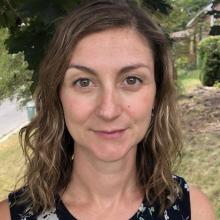Heather Murphy
Associate Professor in the Department of Pathobiology in the Ontario Veterinary College (OVC) working in the area of One Health.

- Dr. Murphy has over sixteen years of experience in water/wastewater treatment, water quality, drinking water distribution, risk assessment and environmental health in both North America and abroad. Dr. Murphy obtained her PhD in Environmental Engineering from the University of Guelph, Canada, where she focused on appropriate household water treatment technologies in rural Cambodia.
- Following her PhD, she worked for the United Nations International Emergency Children’s Fund (UNICEF) as a Water, Sanitation and Hygiene Specialist in Mali and Madagascar. While in Mali, she coordinated a $25 million dollar Water, Sanitation and Hygiene (WASH) in Schools program, covering 1000 schools, the largest program of its kind in the world. She returned to academia in 2013 and completed a research fellowship with the Public Health Agency of Canada where she focused on quantifying the burden of waterborne disease on the Canadian population. In 2015 she joined Temple University's College of Public Health where she was an Assistant Professor for 5 years and where she currently maintains an adjunct Associate Research Professor Position.
- As of September 1, 2020, she joined the Department of Pathobiology, in the Ontario Veterinary College (OVC) as an Associate Professor working in the area of One Health.
Dr. Murphy’s research interests involve understanding and addressing water and health challenges in both developed and developing countries. She leads the Water, Health and Applied Microbiology (WHAM) Lab. Her research focuses on four key areas related to microbial quality of water and public health:
1. Surface water quality and recreation,
2. The impact of septic systems and agricultural activity on private wells,
3. Microbial Ecology of drinking water distribution systems and
4. Water and Sanitation challenges in resource limited settings.
Her research has been funded by the United States Geological Survey (USGS), the National Institutes of Health, the Bill and Melinda Gates Foundation, UNICEF, Grand Challenges Canada, the Philadelphia Water Department, Drexel's Academy of Natural Sciences, the Pennsylvania Department of Health (PA Cure funds) and The Department of Public Health for the City of Philadelphia.